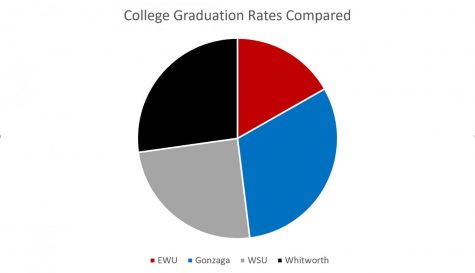EWU’s Graduation Rate
May 18, 2021
EWU has a graduation rate of 45% according to the U.S. Department of Education. However, it’s not exactly as simple as a single number. Graduation rates are constantly changing, and there’s often many factors involved.
It is important to note that EWU’s 45% graduation rate applies strictly to a sample of students who were first-time, and full-time, students. The 45% metric also refers only to students who graduated within four years. Students often graduate at higher rates the longer they work toward their bachelor’s degree. According to Collegefactual, EWU students who have been working toward their bachelor’s degree for six years have a graduation rate of 56.8%. Students who were enrolled at EWU for eight years have a graduation rate of 58%, according to the Department of Education’s college scorecard. Based on this, it is clear that most EWU students don’t graduate within four years.
EWU’s in-state tuition is currently set at $7,525, which is remarkably cheap compared to Gonzaga ($45,140), Whitworth ($44,940) and WSU ($11,841). According to the U.S. Department of Education, Gonzaga’s graduation rate is 83.8%, Whitworth’s is 73%, and WSU’s is 66.3%.
EWU sits at the low end of the spectrum for tuition cost as well as graduation rate. Gonzaga’s graduation rate is almost twice EWU’s, but the cost of tuition is nearly six times EWU’s. The implication of this data is that any prospective students should consider making a personal cross-benefit analysis of these options, and others, before deciding which school to attend.

There are too many factors involved to make the argument that the cost of tuition has an effect on the graduation rate. However, the correlation appears nonetheless.
It is important to remember that, when students transfer from EWU to another university before graduating, it lowers EWU’s graduation rate; even if those students eventually went on to earn their degree elsewhere. A study done by student achievement measure (SAM) claims that 11% of EWU students who have transferred to another college did graduate. Yet, only 8% transferred but did not graduate.
Social stigma may influence a prospective student’s decision. It’s common practice that a degree from one college is more socially admired than a degree from another college. However, accurate information does not change. For example, commonplace scientific laws are not dependent on the college that teaches it. The content of any degree usually pertains to the same objective information. Of course, the differences in curriculum requirements do vary depending on the institution, but objective data, historical recordings and classical texts which make up the content of coursework and the effect of this content on education do not dictate the value of that knowledge to an individual.








